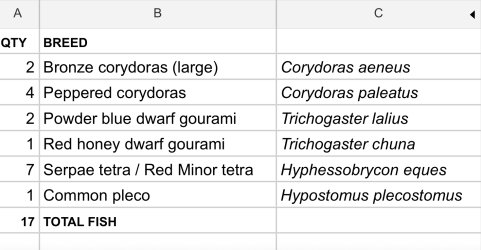First thing is to get as big a tank as possible. The bigger the tank, the more water it holds and the more stable the environment for the fish. You mentioned you don't want something too big so I would suggest a 10 gallon (40 litre) tank as minimum. Anything smaller than that will significantly limit you to what can be kept and the water will go off very quickly.
When you get an aquarium, try to get one that is long and wide rather than square or tall. Fish swim left to right and if you have a small area (length x width), you limit the area the fish can move about in. If the tank is tall and narrow, that stops fish being able to swim properly and they have to move up and down, which isn't normal.
eg: A tank that is 2 foot long x 1 foot wide x 1 foot high is better for fish than a tank that is an 18 inch cube.
-------------------
There's a couple of issues with your roommate's tank (the choice of fish).
Common pleco can grow to 2 feet long and needs a tank that is at least 6 foot long x 3 foot wide. The pleco will be fine for a few years but will eventually need a bigger home. A better fish to have is the bristlenose catfish. They look similar to common plecos but only grow to 4-5 inches.
All labyrinth fishes (gouramis & Bettas) are territorial to some degree. Dwarf gouramis could have a go at the honey dwarf gouramis. The tank is probably big enough if there are lots of floating plants to break up the line of sight but normally I prefer to only keep one species of labyrinth fish per tank.
In relation to the dwarf gouramis (Trichogaster lalius), they regularly carry the gourami Iridovirus and Fish Tuberculosis (Mycobacteria). Neither of these diseases can be treated and if the fish have either of those diseases, then the diseases will remain in the tank until it is disinfected (which means killing the fish and boiling, bleaching or cooking everything in it. In my opinion, nobody should be buying dwarf gouramis until the breeders in Asia clean up their act and stop selling diseased fish.
Serpae tetras are renown fin nippers and might hassle the gouramis. There are 7 of them, which helps but these fish naturally occur in groups of thousands and if they stress out, they could take their frustration out on the other fish.
-------------------
Re: Father Fish and his website. I disagree with a lot of his ideas (some are ok but most aren't in my book of things to do), in particular about not doing water changes. He has a lot of planted tank and that is great for fish. Whilst plants can keep nutrient levels down, they don't remove disease organisms or keep water chemistry stable. When I mentioned that on his website I was told to do something, which I won't repeat here.
You need to do water changes regularly even if the water tests are good. There are lots of things in water that we can't test for and they need to be removed as well.
You do water changes for a number of reasons.
1) to reduce nutrients like ammonia, nitrite & nitrate.
2) to dilute disease organisms in the water.
3) to keep the pH, KH and GH stable.
4) to dilute nitric acid produced by fish food and waste breaking down.
5) to dilute stress chemicals (pheromones/ allomones) released by the fish.
6) to dilute un-used plant fertiliser so you don't overdose the fish when you add more.
7) to remove fish waste and other rotting organic matter.
Fish live in a soup of microscopic organisms including bacteria, fungus, viruses, protozoans, worms, flukes and various other things that make your skin crawl. Doing a big water change and gravel cleaning the substrate on a regular basis will dilute these organisms and reduce their numbers in the water, thus making it a safer and healthier environment for the fish.
If you do a 25% water change each week you leave behind 75% of the bad stuff in the water.
If you do a 50% water change each week you leave behind 50% of the bad stuff in the water.
If you do a 75% water change each week you leave behind 25% of the bad stuff in the water.
Imagine living in your house with no windows, doors, toilet, bathroom or anything. You eat and poop in the environment and have no clean air. Eventually you end up living in your own filth, which would probably be made worse by you throwing up due to the smell. You would get sick very quickly and probably die unless someone came to clean up regularly and open the place up to let in fresh air.
Fish live in their own waste. Their tank and filter is full of fish poop. The water they breath is filtered through fish poop. Cleaning filters, gravel and doing big regular water changes, removes a lot of this poop and harmful micro-organisms, and makes the environment cleaner and healthier for the fish.
Whilst you might not have ammonia, nitrite or nitrate problems due to the plants, the number of micro-organisms in your tank will be growing exponentially due to lack of water changes and this will eventually cause problems to the fish. Plants can't reduce the number of disease organisms in the water and plants can't fix water hardness or pH. Water changes can and should be done regularly to dilute disease organisms and help keep the water chemistry stable.


